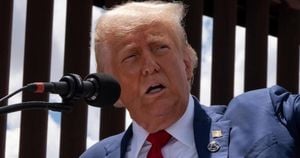The International Criminal Court (ICC) has recently made headlines with its decision to issue arrest warrants for Israel's Prime Minister Benjamin Netanyahu, former Defense Minister Yoav Gallant, and Hamas' military chief Mohammed Deif. These warrants stem from allegations of war crimes and crimes against humanity, rooted firmly within the current Israeli-Palestinian conflict.
On November 21, 2024, the court's verdict brought to light serious accusations against high-ranking officials during a period marked by significant violence, particularly from October 8, 2023, to May 20, 2024. The allegations include using starvation as a warfare tactic and intentionally attacking civilian populations, including medical facilities, all contributing to widespread suffering within Gaza.
ICC Prosecutor Karim Khan’s initial applications for the warrants were filed six months before the ICC's ruling. He expressed concerns about any delays affecting the rights of the victims involved, prompting this urgent call for accountability at the highest levels of political and military leadership.
The response from Israel has been swift and vehement. Netanyahu’s office released statements labeling the court's actions as “absurd” and politically motivated, framing them as modern anti-Semitism masquerading as justice. The Prime Minister's rhetoric likened the situation to historical injustices faced by Jews, particularly referencing the Dreyfus affair, where public sentiment led to the wrongful conviction of Captain Alfred Dreyfus on charges of treason.
On the Hamas side, the group welcomed the ICC's decision as a significant step toward justice for Palestinians. Hamas spokesperson Basem Naim described the warrants as an important progression but noted the effectiveness of this action would depend on global support and cooperation from member states. He implied the necessity for heightened accountability of other Israeli officials as well.
Within the Gaza Strip, local reactions have been muted with skepticism. Some residents voiced doubts about the ICC's capacity to enforce these warrants, especially considering the unwavering support of the United States for Israel. Al Jazeera's reporting from central Gaza reflects this ambivalence, with locals questioning whether the outcomes from such legal proceedings might be undermined by international political dynamics.
The international community's reactions have varied significantly. Jordan’s Foreign Minister Ayman Safadi emphasized the necessity to respect the ICC's decision, advocating for Palestinian rights. Conversely, the United States expressed its fundamental rejection of the ICC's authority, dismissing the warrants as lacking jurisdiction and critiquing the procedural irregularities leading to this announcement.
Countries like Canada have taken a more conciliatory approach, urging adherence to international law and the rulings of international courts. South Africa expressed support for the ICC's move, characterizing it as pivotal for justice and adherence to human rights standards.
European nations have adopted diverse stances. Josep Borrell, the EU’s chief foreign policy representative, reinforced the obligation of member states to adhere to court decisions, framing the ICC's actions as beyond political reproach. Meanwhile, the Netherlands pledged to adhere to the warrants, signaling readiness to arrest Netanyahu and Gallant should they enter Dutch territory.
France’s response was somewhat ambiguous, affirming compliance with ICC statutes but mumbling about the legal intricacies of executing the arrest of high-profile leaders. Countries like Norway emphasized the court's commitment to fair trial standards, asserting the need for judicious procedure moving forward.
Hamas' military chief Mohammed Deif’s situation is precarious, with the ICC inclusive of warrants naming him on similar charges of atrocities committed against Israelis and Palestinians alike. Notably, Israel announced Deif's death over the summer; nonetheless, the ICC continues to assess the situation with caution.
Importantly, the ICC's recent actions arise from its broader aim to uphold justice for serious violations of international law, particularly within the contexts of sustained conflict and human rights abuse. Its mandate covers grave matters like genocide, war crimes, and crimes against humanity, and seeks to fill the gaps where national systems may fail.
The warrants are set within the complex web of events following the Hamas-led attack on Israel on October 7, 2023, which triggered significant military responses from Israel, leading to catastrophic losses of life on both sides. with reports citing nearly 44,000 casualties across Gaza amid military operations. These figures represent deep human suffering and underlie the everyday reality of despair for countless families caught within the conflict zone.
Both Netanyahu and Gallant’s positions as leaders exacerbate the struggle for accountability, with the ICC highlighting their roles as civilian superiors who directed attacks against civilians. This classification elevates their potential responsibility under international law, compelling member states to act should these leaders enter territories under their jurisdiction.
The interplay between warfare, justice, and political intricacies gives rise to heightened tensions; with states under obligation to respect the ICC's processes yet often swayed by their national interests and alliances, the exact implementation of these warrants remains uncertain.
Agnès Callamard, Secretary General of Amnesty International, framed the warrants as historic, marking progress against impunity for crimes against humanity, particularly for victims of systemic injustices faced by Palestinians. She implored ICC member states and international allies of Israel to uphold their commitment to the Rome Statute, ensuring those charged are brought to justice.
Conclusively, the issuance of these arrest warrants reflects both the dire state of political and military relations within the Israeli-Palestinian conflict and the persistent hope for accountability during war, echoing international calls for justice amid growing humanitarian crises. The ICC will continue its investigation, potentially widening its scope as it works to uphold international legal standards, bringing to the forefront the grim realities of conflict and the tangible need for accountability on all sides.



